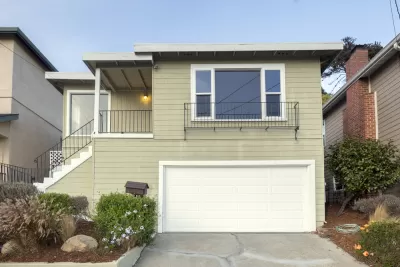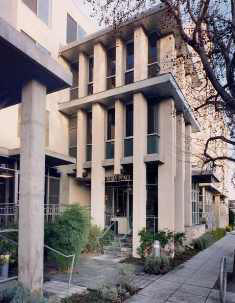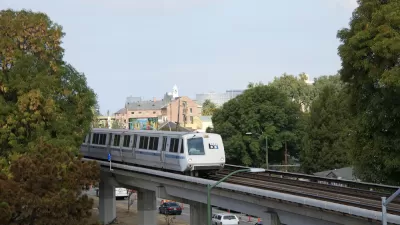AB 744, a bill which requires no more than one parking space be provided for every two units of affordable and senior housing proximate to transit, was signed by Gov. Jerry Brown on Oct. 9.

The legislation, Assembly Bill (AB) 744, Planning and Zoning: Density Bonus, authored by Assemblyman Ed Chau, D-Arcadia, "will allow developers to request reduced minimum parking requirements within affordable housing projects," writes Mary Eveleigh of Smart Growth America. However, they must claim a density bonus to receive these minimum parking requirements [see below for description].
It also amends the parking ratio for affordable housing and senior housing to require no more the 0.5 parking spaces per unit, and amends the ratio for special needs housing to require no more than 0.3 parking spaces per unit.

Photo Credit: Palo Alto Housing Corporation: Alma Place. This 107 unit, Single-Room-Occupancy development has a .5 parking ratio, (53 parking spaces). Located two blocks from the Caltrain Station and Palo Alto Transit Center. Rents range from $486 to $657 depending on income.*
The bill, signed by Gov. Brown on Oct. 9, was "supported by a coalition of over 60 organizations and individuals [PDF], including Smart Growth America’s coalition partners Local Government Commission and TransForm, AARP, the American Planning Association, and Professor Donald Shoup of UCLA," writes Eveleigh.
Opposing it was the formidable League of California Cities, which wrote, "Poorly-planned housing projects with inadequate parking will negatively impact the quality of life of the vulnerable populations of identified residents."
Taking an opposing position was the California Apartment Association, the largest statewide rental housing trade association in the country. "While providing adequate parking is important in a housing development, often times, minimum parking standards do not reflect the demand from tenants for parking," they wrote the governor.
When a project is close to a transit station or houses seniors and others who have fewer vehicles, existing parking requirements do not make sense. These parking spaces, which go unused, can significantly increase the cost of construction and hinder badly needed housing projects.
The state's legislative analysis [PDF] supports that position, and goes further:
Existing parking standards are out of synch with the State’s policies to encourage urban infill development and impede construction of affordable housing and transit‐oriented projects. AB 744 is a timely urban planning solution that will encourage construction of affordable housing, promote economic development and job growth, and reinforce California’s competitions for federal transportation dollars.
Furthermore, the analysis puts the bill into context, tying it to the state's landmark legislation that reduces greenhouse gas emissions and sprawl development.
AB 744 aligns local land use decisions more closely with the goals of AB 32 and SB 375 by reducing the parking required for projects that are close to transit or serve individuals who have fewer cars.
A prior Planetizen post on the bill provides this example of the density bonus cited from a post on the California Land Use Blog on AB 2222, "signed into law on September 27, 2014, which amends the State's Density Bonus Law."
Although application of the statute can be complicated, its aim is fairly simple: When a developer agrees to construct a certain percentage of the units in a housing development for low or very low income households, or to construct a senior citizen housing development, the city or county must grant the developer one or more itemized concessions and a 'density bonus,' which allows the developer to increase the density of the development by a certain percentage above the maximum allowable limit under local zoning law.
Correspondent's note: This writer lived at Alma Place for 14 years.
Hat tip to David Barclay, Palo Alto Daily Post.
FULL STORY: California governor signs bill to ease parking requirements and create more affordable housing

Maui's Vacation Rental Debate Turns Ugly
Verbal attacks, misinformation campaigns and fistfights plague a high-stakes debate to convert thousands of vacation rentals into long-term housing.

Planetizen Federal Action Tracker
A weekly monitor of how Trump’s orders and actions are impacting planners and planning in America.

Chicago’s Ghost Rails
Just beneath the surface of the modern city lie the remnants of its expansive early 20th-century streetcar system.

Bend, Oregon Zoning Reforms Prioritize Small-Scale Housing
The city altered its zoning code to allow multi-family housing and eliminated parking mandates citywide.

Amtrak Cutting Jobs, Funding to High-Speed Rail
The agency plans to cut 10 percent of its workforce and has confirmed it will not fund new high-speed rail projects.

LA Denies Basic Services to Unhoused Residents
The city has repeatedly failed to respond to requests for trash pickup at encampment sites, and eliminated a program that provided mobile showers and toilets.
Urban Design for Planners 1: Software Tools
This six-course series explores essential urban design concepts using open source software and equips planners with the tools they need to participate fully in the urban design process.
Planning for Universal Design
Learn the tools for implementing Universal Design in planning regulations.
planning NEXT
Appalachian Highlands Housing Partners
Mpact (founded as Rail~Volution)
City of Camden Redevelopment Agency
City of Astoria
City of Portland
City of Laramie




























